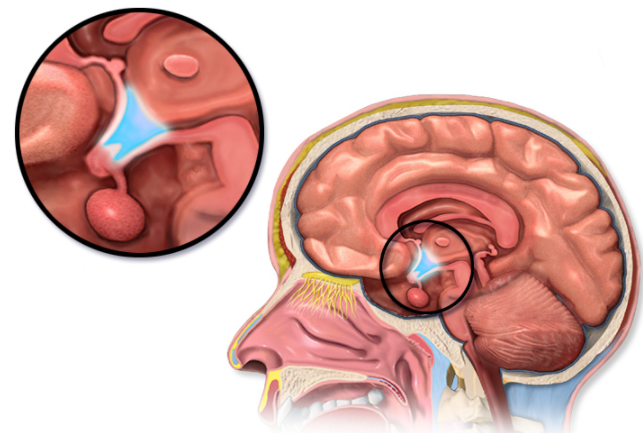
How does the hypothalamus regulate body temperature?
Answer
564k+ views
Hint: Hypothalamus is a small, almond-sized area in the limbic system of the brain. It plays an important role in functions like body temperature, thirst, appetite and weight control, emotions, sleep cycles, childbirth, maintenance of blood pressure and heart rate, production of digestive juices, balancing bodily fluids, etc.
Complete answer:
-The hypothalamus has three parts namely, the anterior region, the middle region, and the posterior region. These parts help in secretion of various endocrine hormones. The anterior and the posterior region plays an essential function to maintain the temperature of the body.
-The hypothalamus has temperature-sensitive neurons in it that can detect the temperature of the blood. Also, there are thermoreceptors in the skin.

-When the outside temperature is hot, the thermoreceptors in the skin send a message that stimulates the anterior hypothalamus which then shows a thermolytic response thereby resulting in a decrease in the body temperature.
-When the outside temperature is cold, the body temperature is raised due to the thermogenic response of posterior hypothalamus stimulation. Thus the body temperature is regulated as per the requirement of the body to keep its other functions well.
Note: Damage to the hypothalamus may affect organs that are under the control of pituitary gland, such as the adrenal glands, gonads, and thyroid gland. Disorders of the hypothalamus include:
-Hypopituitarism (deficiency in pituitary hormone production)
-Hypothyroidism (deficiency in production of thyroid hormone)
-Sexual disorders
Causes of hypothalamic diseases may be Surgeries, radiation, and tumours; eating disorders, such as bulimia or anorexia; genetic disorders that cause excess iron buildup in the body, malnutrition, infections, excessive bleeding
Complete answer:
-The hypothalamus has three parts namely, the anterior region, the middle region, and the posterior region. These parts help in secretion of various endocrine hormones. The anterior and the posterior region plays an essential function to maintain the temperature of the body.
-The hypothalamus has temperature-sensitive neurons in it that can detect the temperature of the blood. Also, there are thermoreceptors in the skin.

-When the outside temperature is hot, the thermoreceptors in the skin send a message that stimulates the anterior hypothalamus which then shows a thermolytic response thereby resulting in a decrease in the body temperature.
-When the outside temperature is cold, the body temperature is raised due to the thermogenic response of posterior hypothalamus stimulation. Thus the body temperature is regulated as per the requirement of the body to keep its other functions well.
Note: Damage to the hypothalamus may affect organs that are under the control of pituitary gland, such as the adrenal glands, gonads, and thyroid gland. Disorders of the hypothalamus include:
-Hypopituitarism (deficiency in pituitary hormone production)
-Hypothyroidism (deficiency in production of thyroid hormone)
-Sexual disorders
Causes of hypothalamic diseases may be Surgeries, radiation, and tumours; eating disorders, such as bulimia or anorexia; genetic disorders that cause excess iron buildup in the body, malnutrition, infections, excessive bleeding
Recently Updated Pages
Master Class 11 Computer Science: Engaging Questions & Answers for Success

Master Class 11 Business Studies: Engaging Questions & Answers for Success

Master Class 11 Economics: Engaging Questions & Answers for Success

Master Class 11 English: Engaging Questions & Answers for Success

Master Class 11 Maths: Engaging Questions & Answers for Success

Master Class 11 Biology: Engaging Questions & Answers for Success

Trending doubts
One Metric ton is equal to kg A 10000 B 1000 C 100 class 11 physics CBSE

There are 720 permutations of the digits 1 2 3 4 5 class 11 maths CBSE

Discuss the various forms of bacteria class 11 biology CBSE

Draw a diagram of a plant cell and label at least eight class 11 biology CBSE

State the laws of reflection of light

Explain zero factorial class 11 maths CBSE




